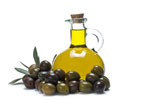 When you break out the frying pan and get set for some cooking, what oil do you reach for? A new study brings with it some interesting health advice in terms of potentially toxic exposure. It bears important health tips for those who like to use sunflower oil in particular.
When you break out the frying pan and get set for some cooking, what oil do you reach for? A new study brings with it some interesting health advice in terms of potentially toxic exposure. It bears important health tips for those who like to use sunflower oil in particular.
Spanish researchers have discovered certain “aldehydes” in food. These are thought to be related to some neurodegenerative diseases and some types of cancer. They are toxic compounds, found in some oils — such as sunflower oil — that become present when heated. At frying temperature, oil releases aldehydes into the air. The study wanted to see if the toxins stayed in the oil as well — and, as it turns out, they do.
Here’s a great article on The Power of Olive Oil.
The toxic aldehydes are a result of degradation of the fatty acids in oil and, although some are volatile, others remain after frying. That is why they be found in cooked food. As they are very reactive compounds, they can react with proteins, hormones and enzymes in the organism and impede its correct functioning.
The research involved heating olive oil, sunflower oil, and linseed oil in a deep fryer at 190 degrees Celsius. This was carried out for 40 hours for the first two oils and 20 hours for the linseed oil (which isn’t much as used in food, but has high omega-3 content).
After applying special techniques, researchers found that sunflower and linseed oil are the ones that create the most toxic aldehydes in less time. These oils are high in polyunsaturated fats (which are very healthy).
Olive oil carries a higher concentration of monounsaturated fats, and wound up generating less of these toxins in a longer period of time. That means that, from this standpoint, it is safer to use than its sunflower brethren.
Past studies have found that, in oils subjected to frying temperatures, other toxic substances such as “alkyl benzenes” were found. In these studies as well, olive oil created the least amount of toxins.
The researchers said they don’t wish to alarm people, but suggest the data are true and should be taken into account. From this perspective, it seems clear that selecting olive oil over sunflower oil is a suitable way to protect yourself from potential toxic exposure (albeit, likely mild).
